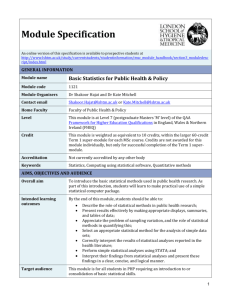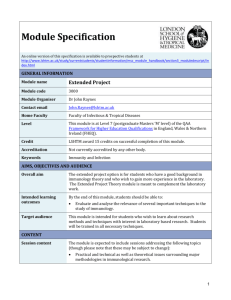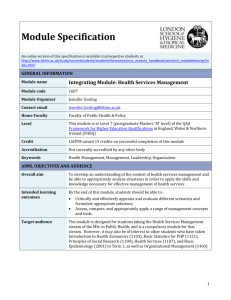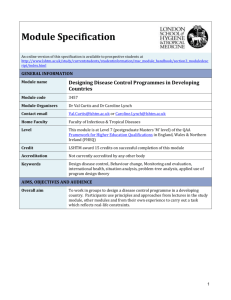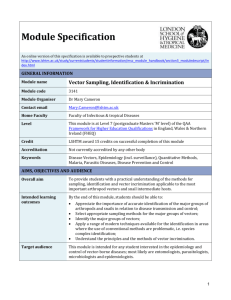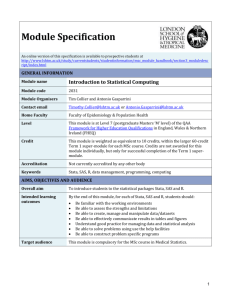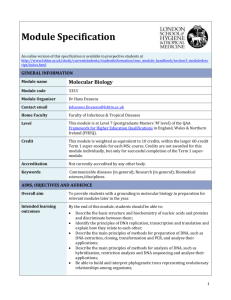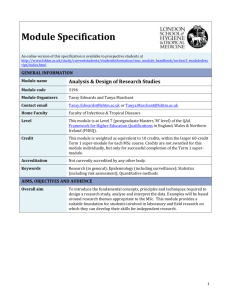Programme Specification * MSc Epidemiology
advertisement
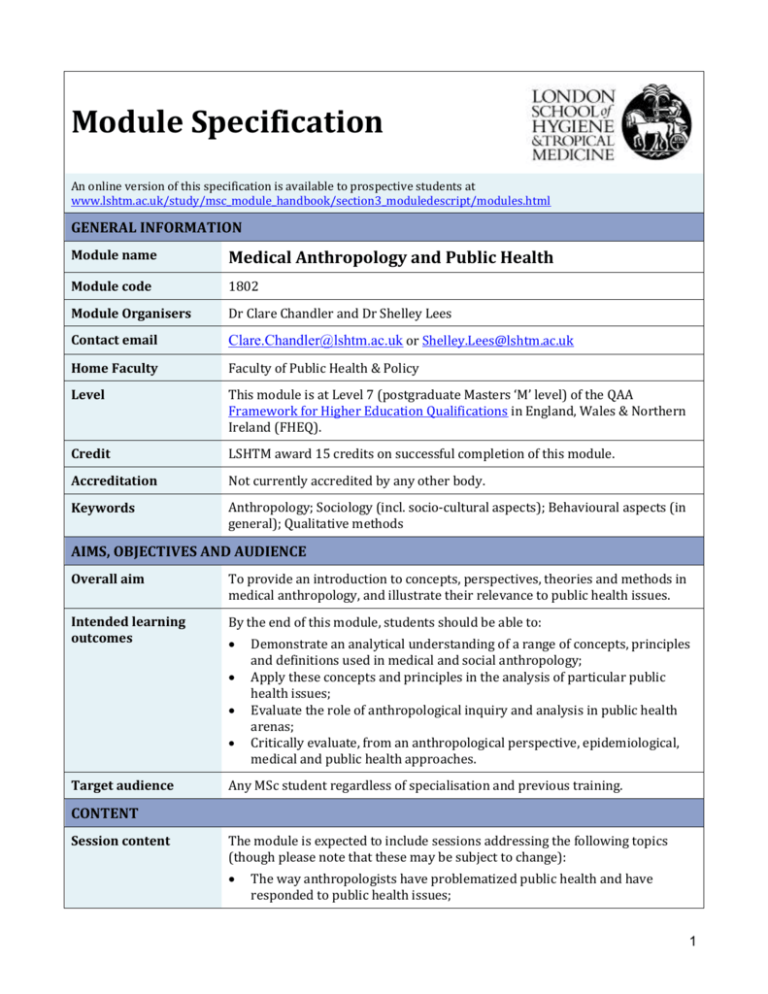
Module Specification An online version of this specification is available to prospective students at www.lshtm.ac.uk/study/msc_module_handbook/section3_moduledescript/modules.html GENERAL INFORMATION Module name Medical Anthropology and Public Health Module code 1802 Module Organisers Dr Clare Chandler and Dr Shelley Lees Contact email Clare.Chandler@lshtm.ac.uk or Shelley.Lees@lshtm.ac.uk Home Faculty Faculty of Public Health & Policy Level This module is at Level 7 (postgraduate Masters ‘M’ level) of the QAA Framework for Higher Education Qualifications in England, Wales & Northern Ireland (FHEQ). Credit LSHTM award 15 credits on successful completion of this module. Accreditation Not currently accredited by any other body. Keywords Anthropology; Sociology (incl. socio-cultural aspects); Behavioural aspects (in general); Qualitative methods AIMS, OBJECTIVES AND AUDIENCE Overall aim To provide an introduction to concepts, perspectives, theories and methods in medical anthropology, and illustrate their relevance to public health issues. Intended learning outcomes By the end of this module, students should be able to: Target audience Demonstrate an analytical understanding of a range of concepts, principles and definitions used in medical and social anthropology; Apply these concepts and principles in the analysis of particular public health issues; Evaluate the role of anthropological inquiry and analysis in public health arenas; Critically evaluate, from an anthropological perspective, epidemiological, medical and public health approaches. Any MSc student regardless of specialisation and previous training. CONTENT Session content The module is expected to include sessions addressing the following topics (though please note that these may be subject to change): The way anthropologists have problematized public health and have responded to public health issues; 1 Anthropological conceptualisations of health, medicine and public health, including those around illness and disease, personhood, risk, structural violence, medicalization, citizenship, research participation and bioethics; Introduction to anthropological methodologies and how to apply these to issues in public health. TEACHING, LEARNING AND ASSESSMENT Study resources provided or required Textbook and collection of complementing readings (articles) for each lecture. Teaching and learning methods The course is delivered through lectures (10 contact hours), seminars (13.5 contact hours), one session “doing ethnography” (2 hours) two film and discussion sessions (5 hours)’two ‘conversations with anthropologists’ sessions (3.0 hours) and one debate (2 hours). The module has a textbook (Pool, R. and Geissler, W., 2005, Medical Anthropology, Open University Press) which students are recommended to purchase. Students are required to read the relevant chapters of the module textbook prior to the lectures and seminars. Other essential references (1-2 per lecture topic) are provided in a course reader. A library box for the course contains additional references and students are encouraged to consult the library for further readings listed for those interested in the topic. Lectures: The lectures will build on key concepts and debates introduced in the module textbook (Pool and Geissler 2005), illustrating their relevance and application through examples from anthropological research in the fields of public health and medicine. Seminars: The seminars encourage discussion around the issues raised in the lecture and associated readings. Some entail practical exercises, where students will work with other resources that highlight central themes from the lectures and readings. Assessment details The module will be assessed through a take home essay-based assignment (100%) to be submitted at the end of the module. For the assignment, students are required to write an essay (2,500 words) on a subject chosen from a range of questions based on the topics covered in the course. In the case of a re-sit, the student will be asked to complete an essay on a different topic to that completed originally. The student will be given 3 weeks to complete the essay. Assessment dates Assessment tasks will be distributed three weeks before the last day of the module for submission on 24 March 2016. For students who are required to re-sit, or granted a deferral or new attempt, the next assessment deadline will be the standard School-recommended date in mid/late September 2016. Language of study and assessment English (please see ‘English language requirements’ below regarding the standard required for entry). TIMING AND MODE OF STUDY Duration The module runs for 5 weeks at 2.5 days per week; this module runs between Monday morning and Wednesday lunchtime. 2 Dates For 2015-16, the module will start on Monday 22 February 2016 and finish on Wednesday 23 March 2016. Timetable slot The module runs in LSHTM timetable slot D1. Mode of Study The module is taught face-to-face in London. Both full-time and part-time students follow the same schedule. For full-time students, other LSHTM modules are available in the other half of the week for the C and D slots. Learning time The notional learning time for the module totals 150 hours, consisting of: Contact time ≈ 36 hours Directed self-study ≈ 38 hours Self-directed learning ≈ 31 hours Assessment, review and revision ≈ 45 hours. APPLICATION, ADMISSION AND FEES Pre-requisites None. English language requirements A strong command of the English language is necessary to benefit from studying the module. Applicants whose first language is not English or whose prior university studies have not been conducted wholly in English must fulfil LSHTM’s English language requirements, with an acceptable score in an approved test taken in the two years prior to entry. Applicants may be asked to take a test even if the standard conditions have been met. Student numbers Student numbers are typically 30-50 per year; numbers may be capped due to limitations in facilities or staffing. Student selection Preference will be given to LSHTM MSc students and LSHTM research degree students. Other applicants meeting the entry criteria will usually be offered a place in the order applications are received, until any cap on numbers is reached. Applicants may be placed on a waiting list and given priority the next time the module is run. Full Registration (full participation) by LSHTM research degree students is required for this module, although the assessment for research degrees students is optional. Fees For registered LSHTM MSc students, fees for the module are included within MSc fees (given on individual course prospectus pages). If registering specifically for this module, as a stand-alone short course, individual module fees will apply. Tuition fees must be paid in full before commencing the module, or by any fee deadline set by the Registry. Scholarships Scholarships are not available for individual modules. Some potential sources of funding are detailed on the LSHTM website. 3 Admission deadlines For 2015-16: For registered LSHTM MSc students, the module choice deadline (for Term 2 and 3 modules) is Friday 20 November 2015. If registering specifically for this module, applications may be made at any time but, as places are limited, applications ahead of the MSc deadline are strongly advised. All applications should be submitted at the latest 8 weeks prior to the start of the module. Formal registration will take place on the morning of the first day of the module. ABOUT THIS DOCUMENT This module specification applies for the academic year 2014-15 Last revised 18 June 2014 by Clare Chandler and Shelley Lees London School of Hygiene & Tropical Medicine, Keppel St., London WC1E 7HT. www.lshtm.ac.uk 4

